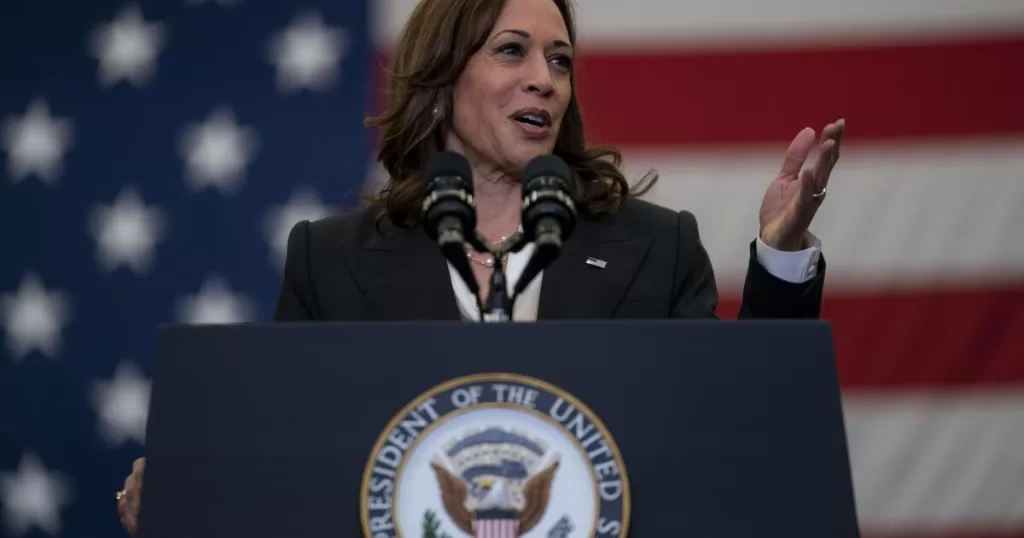No California Democrat has ever been nominated for president. That seems about to change. And it’s not necessarily the best move for the party.
Please pardon me for being a skunk at the picnic where California Democrats are celebrating Vice President Kamala Harris’ expected ascension to replace President Biden as the party’s nominee to battle Donald Trump.
Democrats could do better than Harris and should. It’s an opportunity to excite the electorate with a fresh face and new approaches, burdened by a minimum of Biden baggage.
OK, maybe that’s fantasy.
The reality is Biden waited so long to bow out that it leaves little time for a presidential wannabe to wage a successful fight for the nomination, with the Democratic convention less than a month away.
Given the odds in Harris’ favor — enhanced by the president’s endorsement and quick support of many Democratic politicians — plus the party turmoil a convention brawl would cause, no potential alternative candidate may choose to wage a serious challenge anyway.
And you don’t get recruited by so-called party bosses for these jobs. Smoke-filled rooms no longer exist. You’ve got to run aggressively with barrels of money to be elected leader of the free world. And Harris now will inherit Biden’s campaign stash.
But back to history.
Harris already is a historic figure. The daughter of immigrant parents — a father from Jamaica and a mother from India — she’s several “firsts.”
She’s the first female, the first Black American and the first Asian American vice president. Ditto California attorney general. She was the first Black U.S. senator from California. And she was the first woman and first person of color to be elected San Francisco district attorney.
Harris now is on track to become the nation’s first female president.
She’d also be the first California Democrat to be nominated for president. That’s amazing considering that California grew into the nation’s most populous state six decades ago.
Former Gov. Jerry Brown tried three times to gain the Democratic nod and failed, mostly miserably but always flamboyantly.
California Gov. Gavin Newsom keeps being speculated about, but you can forget about him challenging Harris. Newson has long said he wouldn’t run against his longtime California ally.
For most of California’s history, this has been a swing state, usually turning from purple to red on election day.
In fact, the Republican Party’s first presidential nominee in 1856 was a Californian: explorer, general and U.S. Senator John C. Frémont. He lost to Democrat James Buchanan.
Two California Republicans — Richard Nixon and Ronald Reagan — were elected president.
But demographic changes have turned California into a deep-blue state. There are many millions more voters of color these days. And they vote reliably Democrat at the top of the ticket, although nationally the GOP seems to be making inroads with Latino voters.
State and big-city governing in California has become so leftist that this could be a big problem for Harris. She’s sure to be maligned as a “San Francisco Democrat,” a species feared by many moderates in battleground states.
California has spectacular beaches and majestic mountains, Hollywood and Silicon Valley. But it also has very high taxes, a homeless headache, unaffordable housing and is the state with the largest population of immigrants in the country illegally.
Trump already is campaigning against Harris as Biden’s failed immigration czar. Never mind that he shamefully torpedoed a bipartisan solution in Congress, telling Republicans he wanted to keep alive the issue for campaign fodder.
And as the Trump campaign delves into Harris’ record as state attorney general, they’ll find she was anything but a profile in courage on issues she always had claimed were top concerns. She tended to avoid stands on politically tough issues, particularly on matters that might upset law enforcement, a powerful interest group in attorney general politics.
An example: Although a careerlong opponent of the death penalty, she was publicly neutral on ballot measures in 2012 and 2016 to abolish capital punishment. Both measures failed. She also didn’t take a stand on a proposition to expedite the death penalty. It narrowly passed.
But Trump does make a good target for Harris. The former prosecutor certainly will be a better debater than the deer-in-headlights Biden.
And Harris, 59, will erase age as a campaign issue — perhaps even flip it around against Trump, 78, whose undisciplined, meandering nomination acceptance speech last week showed signs of cognitive decline.
Hopefully Harris will be a much better, more forceful, less wishy-washy candidate than when she bombed running for president in 2020.
Still the party would be better off if it held a wide-open convention that allowed all presidential aspirants to compete and make their cases, rather than just anointing the vice president. It could result in nominating the best candidate and future president. And it certainly would excite the voters and stimulate interest in the nominee.
But some possible top-tier replacements are already lining up behind Harris, thinking the nomination is a done deal and perhaps hoping to be her running mate.
Whatever the outcome, California already has played a significant role. Influential former House Speaker Nancy Pelosi and Rep. Adam B. Schiff of Burbank pushed Biden to step aside.
And California’s delegation will be the largest at the Democratic convention by far, offering 22% of the votes needed to win the nomination. Presumably it will back the Californian.
Harris’ nomination seems inevitable. She might not be the best choice. But she’ll at least raise the odds of stopping the despicable Trump.
